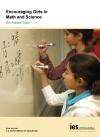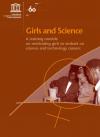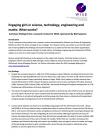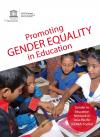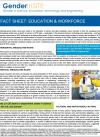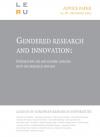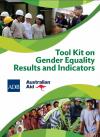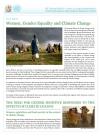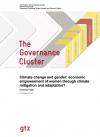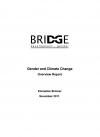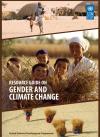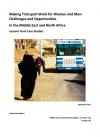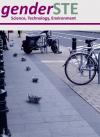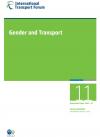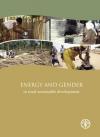Resources
19 Sep 2016
U.S. Department of Education/Institute of Education Sciences, 2007: Practice guide formulates specific and coherent evidence-based recommendations for STEM educators to encourage girls in these fields. The target audience is teachers and other school personnel with direct contact with
students. It includes specific recommendations as well as evidence to support them.
19 Sep 2016
Girls and Science: A training module on motivating girls to embark on science and technology careers
UNESCO, 2006: Module provides counselling and guidance materials covering science education, depicting the overall picture of women in science including beliefs, attitudes, cultural and societal pressures, together
with examples of famous female scientists. It provides career guidance tools as well as ways to reduce the under-representation and under-achievement of girls in STEM.
TYPE: Training
19 Sep 2016
Women in to Science and Engineering (WISE), 2012: Summary of key points from a UK-based research review of gender in STEM and recommendations for organizations working to attract more women and girls to study science, technology, and mathematics.
TYPE: Data
19 Sep 2016
UNESCO, 2009: Toolkit provides various tools intended for us primarily by representatives (gender focal points) from ministries of
education in the Asia-Pacific region, including tools for raising gender awareness, tools for creating gender-responsive educational environments, and more.
TYPE: Toolkits
19 Sep 2016
GenderInSITE, 2015: Fact sheet provides at-a-glance overview of gender issues in education and the workforce.
TYPE: Data
19 Sep 2016
League of European Research Universities, 2015: Paper outlines research areas with a need for gender analysis in research and innovation (GRI) and explains the role of Social Sciences and Humanities
research in GRI. It gives concrete examples of research projects that include a GRI dimension and looks at established or emerging practice at LERU universities and other organizations.
TYPE: Policy briefs
19 Sep 2016
Asian Development Bank/Australian Aid, 2013: Toolkit presents a menu of gender equality outcomes, results, and indicators that may be selected or adapted by development practitioners to ensure that gender perspectives are incorporated into development initiatives, and to monitor and evaluate gender equality results.
TYPE: Toolkits
16 Sep 2016
UN WomenWatch, 2009:
Fact sheet provides an analysis of how women are affected by climate change and how they respond, together with references to relevant United Nations mandates and information sources
TYPE: Data
16 Sep 2016
GTZ, 2010:
Working paper traces the ways in which women’s economic empowerment through climate mitigation and adaptation fosters economic growth and socioeconomic development, reduces poverty, keeps environmental problems in check, and increases the potential for adaptation
TYPE: Reports
16 Sep 2016
BRIDGE, IDS, 2011:
Report maps pathways for making climate change responses more gender aware and potentially transformative, arguing that gender transformation should be both a potential end goal and an important condition of effective climate change responses and poverty reduction [Available in English, Spanish and French]
TYPE: Reports
16 Sep 2016
UNDP, 2009:
Guide for practitioners and policy makers on the linkages between gender equality and climate change and their importance in relation to the achievement of the MDGs, highlighting why it is important to include women in climate change policy and programming, and demonstrating how women’s contributions can strengthen the effectiveness of climate change measures.
TYPE: Policy briefs, Reports
16 Sep 2016
World Bank, 2011: Four case studies conducted in Casablanca, Morocco, Sana’a and rural
Yemen, and the northern part of the West Bank in Palestine aim to help fill the gender data gap by increasing
understanding of the ways in which transport services are facilitating or constraining women’s access to resources,
markets, training, information, and employment.
REGIONS: Arab Region
TYPE: Case studies, Reports
15 Sep 2016
genderSTE – European Cooperation in Science and Technology (COST):
Fact sheet on gender in transportation
TYPE: Data
15 Sep 2016
OECD International Transport Forum, 2011:
Report presents an overview of gender issues in transport as well as good practices and a set of recommendations for both developed and developing countries, urban and rural areas, and infrastructure and services
TYPE: Policy briefs, Reports
15 Sep 2016
FAO, 2006:
Paper discusses gender issues and energy linkages within the international sustainable development context and presents recommendations on ways of incorporating gender sensitivity into energy and development policies and planning processes
TYPE: Reports
- ‹ previous
- 6 of 9
- next ›




